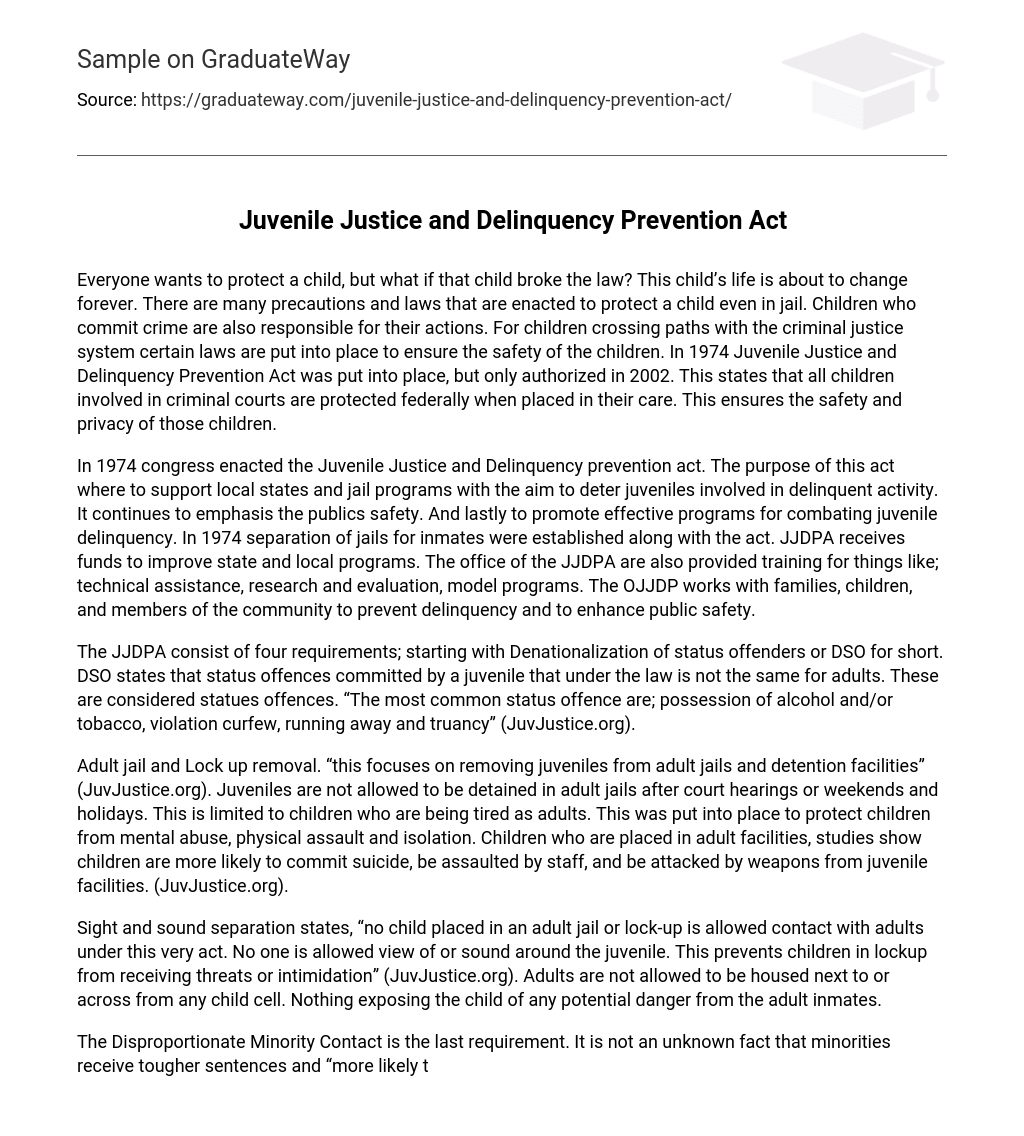Everyone wants to protect a child, but what if that child broke the law? This child’s life is about to change forever. There are many precautions and laws that are enacted to protect a child even in jail. Children who commit crime are also responsible for their actions. For children crossing paths with the criminal justice system certain laws are put into place to ensure the safety of the children. In 1974 Juvenile Justice and Delinquency Prevention Act was put into place, but only authorized in 2002. This states that all children involved in criminal courts are protected federally when placed in their care. This ensures the safety and privacy of those children.
In 1974 congress enacted the Juvenile Justice and Delinquency prevention act. The purpose of this act where to support local states and jail programs with the aim to deter juveniles involved in delinquent activity. It continues to emphasis the publics safety. And lastly to promote effective programs for combating juvenile delinquency. In 1974 separation of jails for inmates were established along with the act. JJDPA receives funds to improve state and local programs. The office of the JJDPA are also provided training for things like; technical assistance, research and evaluation, model programs. The OJJDP works with families, children, and members of the community to prevent delinquency and to enhance public safety.
The JJDPA consist of four requirements; starting with Denationalization of status offenders or DSO for short. DSO states that status offences committed by a juvenile that under the law is not the same for adults. These are considered statues offences. “The most common status offence are; possession of alcohol and/or tobacco, violation curfew, running away and truancy” (JuvJustice.org).
Adult jail and Lock up removal. “this focuses on removing juveniles from adult jails and detention facilities” (JuvJustice.org). Juveniles are not allowed to be detained in adult jails after court hearings or weekends and holidays. This is limited to children who are being tired as adults. This was put into place to protect children from mental abuse, physical assault and isolation. Children who are placed in adult facilities, studies show children are more likely to commit suicide, be assaulted by staff, and be attacked by weapons from juvenile facilities. (JuvJustice.org).
Sight and sound separation states, “no child placed in an adult jail or lock-up is allowed contact with adults under this very act. No one is allowed view of or sound around the juvenile. This prevents children in lockup from receiving threats or intimidation” (JuvJustice.org). Adults are not allowed to be housed next to or across from any child cell. Nothing exposing the child of any potential danger from the adult inmates.
The Disproportionate Minority Contact is the last requirement. It is not an unknown fact that minorities receive tougher sentences and “more likely to be imprisoned than white males” (JuvJustice.org). This same injustice occurs in juvenile facilities as well as adult, but the goal is to address the reasoning to level out this problem. This Act is strictly about housing inmates specifically child inmates. “OJJDP carries out its’s purposes through research, and policies” (JuvJustice.org).
Juveniles commit violent crimes like; “murder, forcible rape, robbery, and aggravated assault” (EveryCRSReports.com, 2007). This increase has been from the late-1980’s to mid90’s. The increase of violent crimes is a direct link to gangs connected to the crack-cocaine. From this time span “47% of overall violent crimes committed by juveniles have decreased” (EveryCRSReports.com,2007). Many children do not get formally charged meaning many issues do not get resolved. According to the CRSReports, “for every youth arrested during the last 90’s at least 10 others engaged in that same behavior could have been hurt or killed another person (EveryCRSReport.com,2007).
The Delinquency prevention act improves the confinement issues requiring so many things to be done when housing a child. Facilities have to increase screening to help better identify the health behaviors within the inmate these could include, substance abuse and mental health. Staff must work together to interact with the families to ensure the child in the case must get the proper rehabilitation. In the hopes that the child does not come back through the doors.
Being arrested may result in a record. A child with a record still has a chance. Congress gave the right to the courts to expunge the record if the subjected to the projects and programs out into place to deter the child for making the same mistakes. Education is recognized as important to youth even making programs to transfer credits after serving their time and reentering the community.
JABG programs helped states cut down on offending. These programs help offenders and repeat offenders stay out of jail making the likelihood of reoffenders decline.
In conclusion, this specific amendment secures the safety of a child. This child is protected from adult inmates from physical and mental harm. Those children we are concerned about the well being of their child in their care are the ones who have conflict of interest. I feel this law is doing a sufficient job on guarding these children. This law is still being revamped but is still being used under the law. Continuing this law will result in the same outcomes. To deter the juvenile from reentering jail, but to continue the programs in the hopes of not becoming a career criminal.





